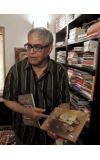
24 Aug 2011 01:40:59
Pakistan is a country that reveres poetry, gently weaving it into daily life, and the last decade has provided no shortage of material. The rise and fall of a military ruler, the demands of a foreign superpower, the devastation of Taliban bombs — these themes and more have crept into Pakistani poems.
Some of the resulting verses carry overt messages about specific events. Often, though, the approach is more subtle, and occasionally, it's tinged with humor.
"Of course, everything which is happening around a poet, it has an effect," said Shahzad Nayyar, a published poet based in the eastern city of Lahore. "Such ... events, which are causing destruction, which are causing loss to man, material and property, they are affecting poets a lot."
Although Pakistan is just 64 years old, its people's poetic tradition is centuries old and is intertwined with that of the rest of South Asia, while also influenced by the Persians. Urdu is the most widely used language, but even regional languages, such as Pashto and Sindhi, have notable poetic histories.
Today in Pakistan, one can find poetic verses on the back windows of taxis, on the sides of delivery trucks and atop gravestones. Newspapers regularly publish poetry, while Pakistani politicians, such as the country's ambassador to the U.S., post verses on their Twitter feeds or use them in speeches.
Poetry recitals — known as "mushairas" — can draw thousands of spectators and last deep into the night, with audiences shouting encouragement to the men and women onstage. Sometimes, mushairas are part of larger gatherings, such as weddings or trade conferences; others are intimate affairs.
The country even has a national holiday dedicated to a poet-philosopher, Allama Muhammad Iqbal. Iqbal's writings were seen as an inspirational force toward the creation of Pakistan as a Muslim homeland in 1947, though he died in 1938.
Of the 1,000 books published each year in Pakistan, there are some 50 books of poetry, said Saleem Malik, vice chairman of the Pakistan Publishers and Booksellers Association. While a handful of poets may earn enough to live on writing alone, at least for a while, most are engaged in other professions.
Many of the poetry books are self-published and distributed for free among friends. Still, that doesn't account for the poetry that appears in other forums, such as magazines or websites such as Facebook, a popular setting for younger poets who can't afford to publish their own books.
Perhaps the most popular form of poetry in Pakistan is the ghazal, which is made up of five or more units of two lines each and often sung.
Some of the most well-known Pakistani poets say that despite the material provided by the turmoil of recent years, they are careful about how they word their poems and often prefer to use indirect language and symbolism. This is in part to avoid being labeled a "propagandist."
"It loses your emotional power when you are direct — it becomes like a slogan," said Farhat Abbas Shah, a poet especially popular with younger Pakistanis.
Iftikhar Arif — a poet so famed in Pakistan that one section of his many, teeming bookshelves is devoted just to academic tracts written about him — said poets should aspire to write in a universal manner that can be appreciated beyond national borders and withstand the test of time.
There are poems written from other periods of turmoil in Pakistani history that are still relevant today because of this approach. "There is a history, perhaps more honest, more correct, more sincere, written by poets," Arif said.

